高中英语必修一 unit 1 Friendship Period 2 Learning about Language课件(41张)
文档属性
| 名称 | 高中英语必修一 unit 1 Friendship Period 2 Learning about Language课件(41张) | 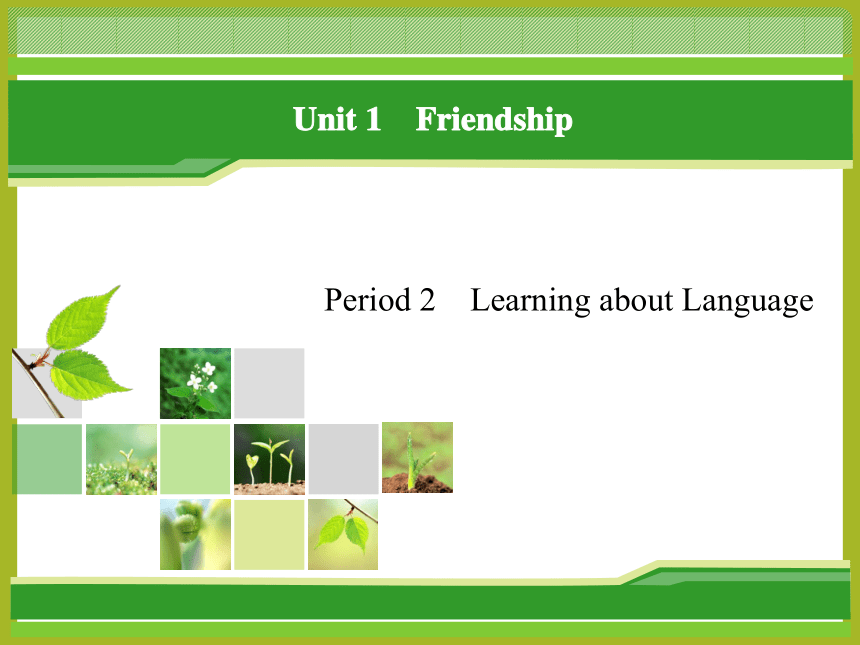 | |
| 格式 | zip | ||
| 文件大小 | 1.3MB | ||
| 资源类型 | 教案 | ||
| 版本资源 | 人教版(新课程标准) | ||
| 科目 | 英语 | ||
| 更新时间 | 2019-03-11 21:51:45 | ||
图片预览

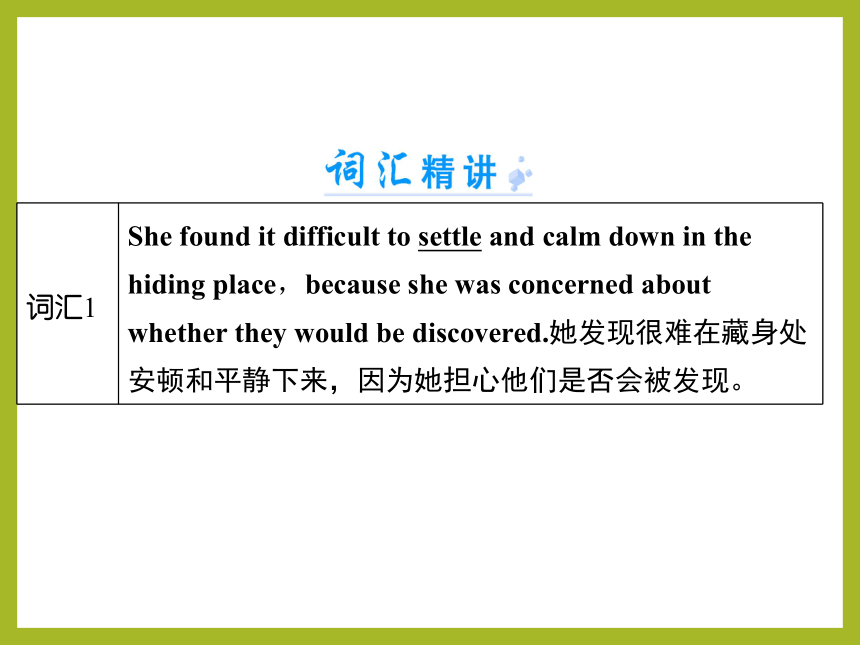
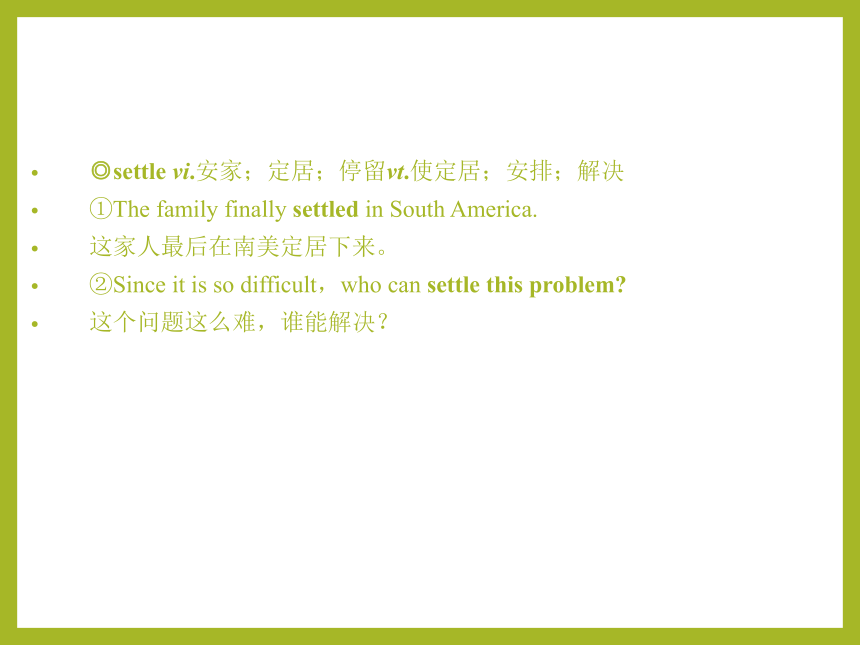
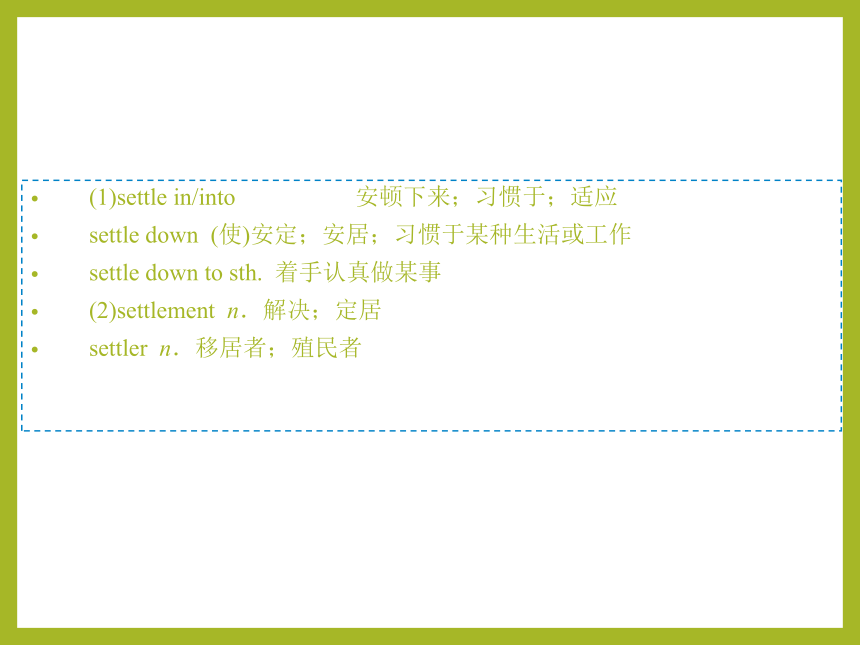
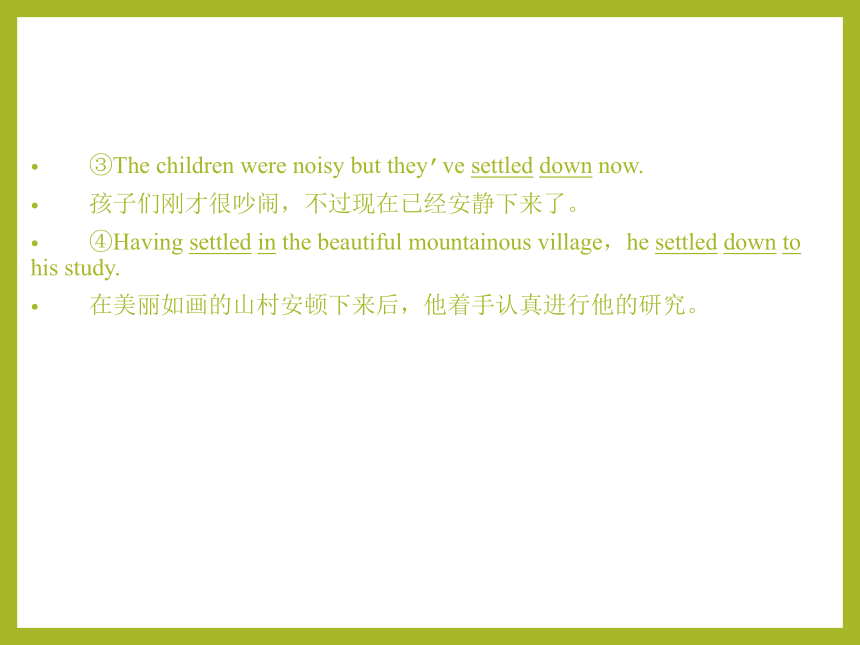
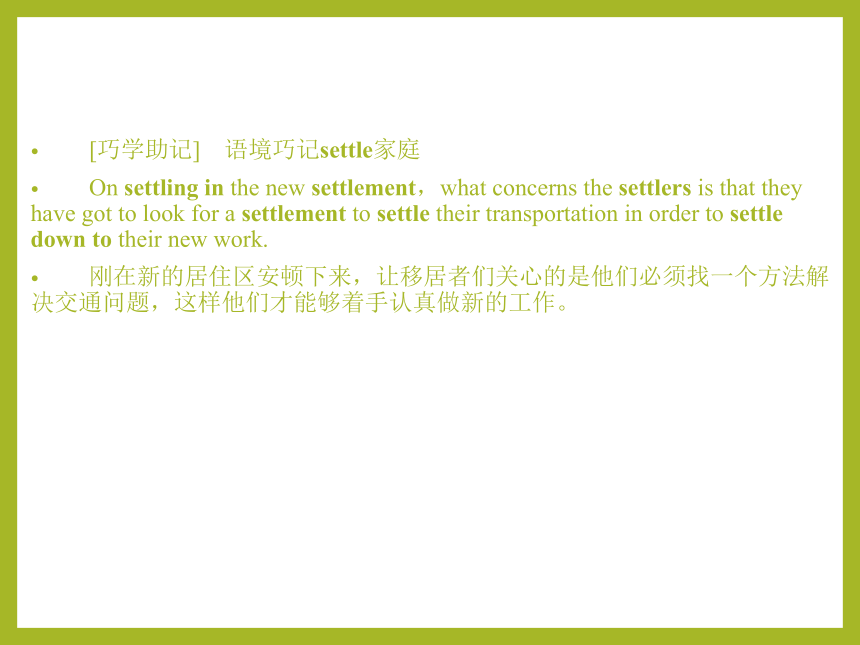
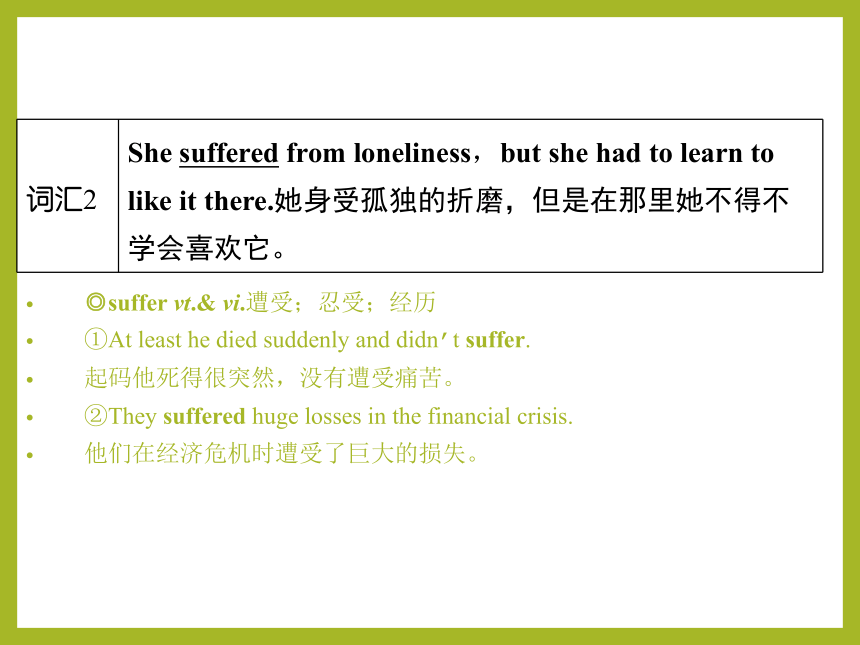
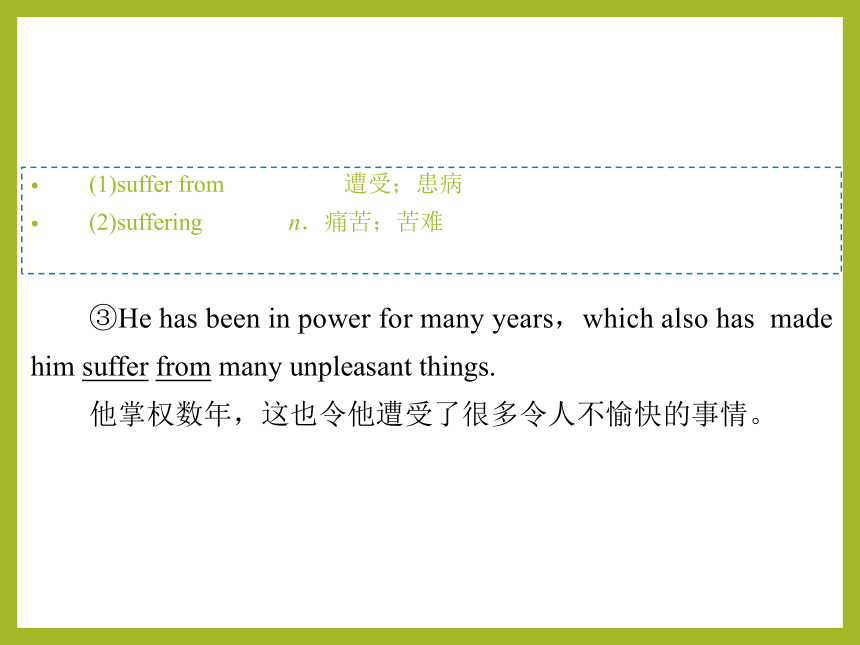
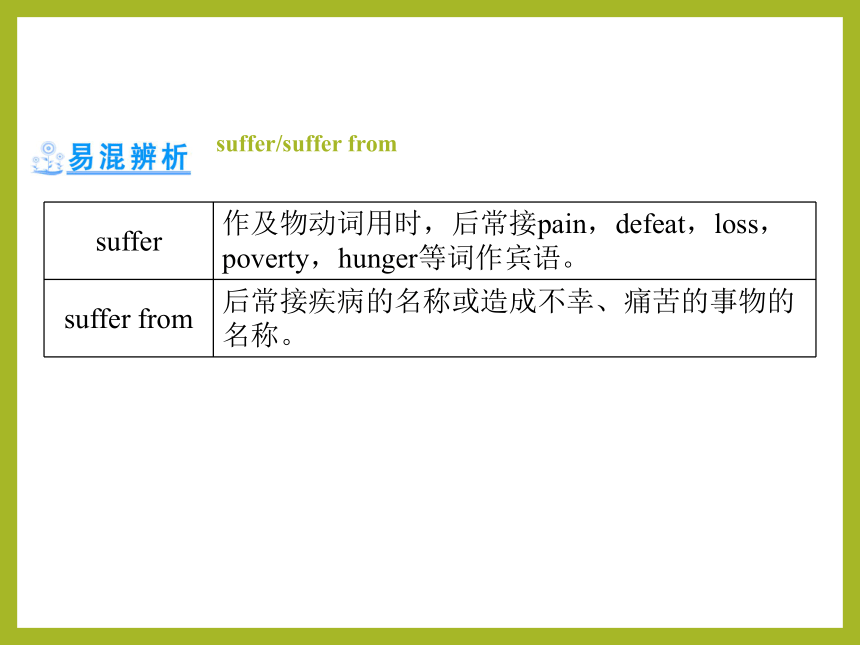
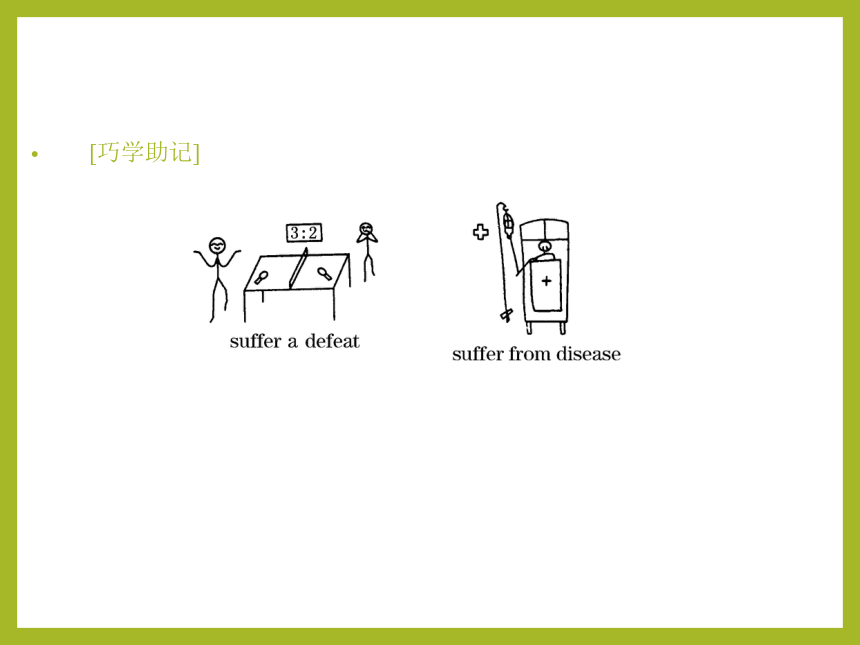
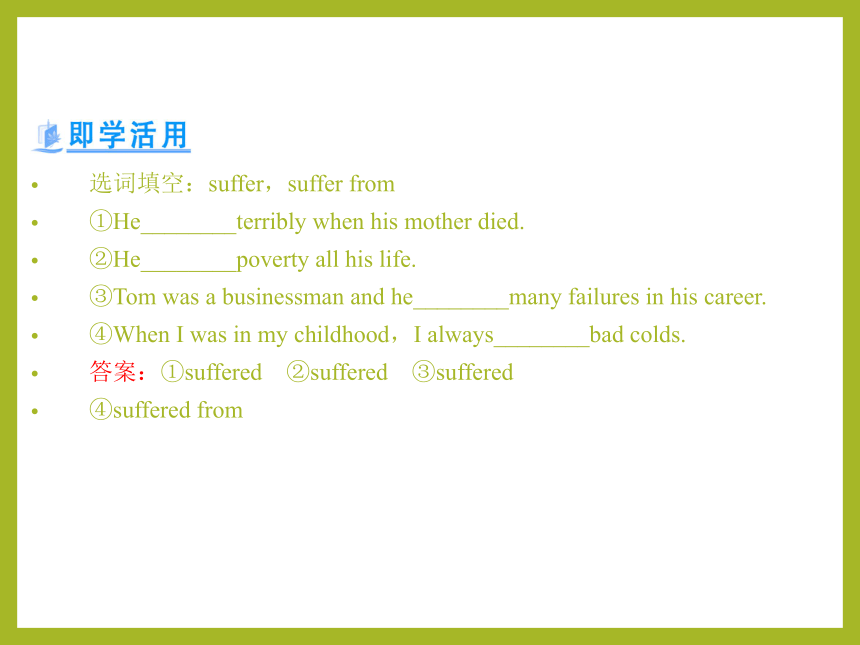
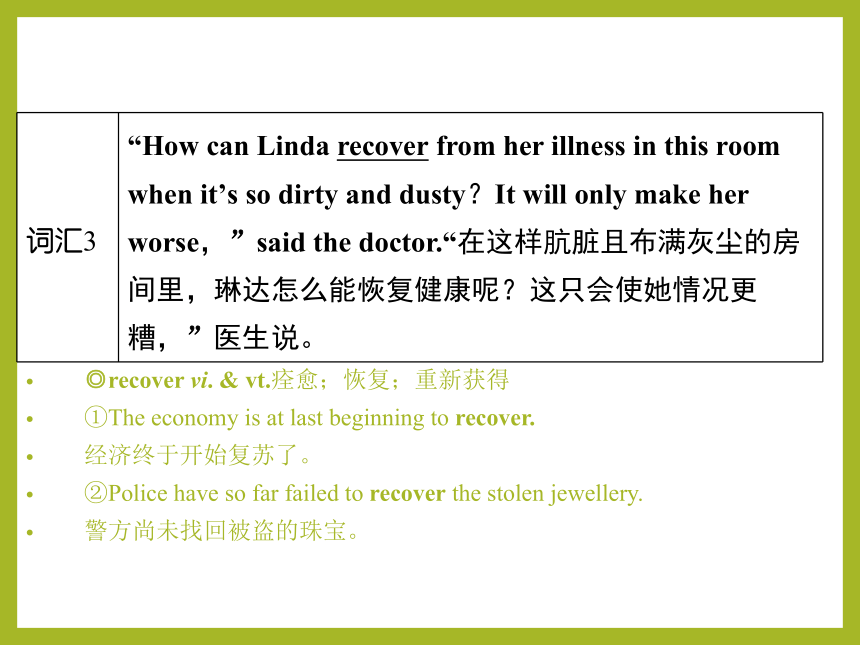
文档简介
课件41张PPT。Unit 1 FriendshipPeriod 2 Learning about Language◎settle vi.安家;定居;停留vt.使定居;安排;解决
①The family finally settled in South America.
这家人最后在南美定居下来。
②Since it is so difficult,who can settle this problem?
这个问题这么难,谁能解决?(1)settle in/into 安顿下来;习惯于;适应
settle down (使)安定;安居;习惯于某种生活或工作
settle down to sth. 着手认真做某事
(2)settlement n.解决;定居
settler n.移居者;殖民者
③The children were noisy but they’ve settled down now.
孩子们刚才很吵闹,不过现在已经安静下来了。
④Having settled in the beautiful mountainous village,he settled down to his study.
在美丽如画的山村安顿下来后,他着手认真进行他的研究。[巧学助记] 语境巧记settle家庭
On settling in the new settlement,what concerns the settlers is that they have got to look for a settlement to settle their transportation in order to settle down to their new work.
刚在新的居住区安顿下来,让移居者们关心的是他们必须找一个方法解决交通问题,这样他们才能够着手认真做新的工作。◎suffer vt.& vi.遭受;忍受;经历
①At least he died suddenly and didn’t suffer.
起码他死得很突然,没有遭受痛苦。
②They suffered huge losses in the financial crisis.
他们在经济危机时遭受了巨大的损失。(1)suffer from 遭受;患病
(2)suffering n.痛苦;苦难③He has been in power for many years,which also has made him suffer from many unpleasant things.
他掌权数年,这也令他遭受了很多令人不愉快的事情。 suffer/suffer from[巧学助记]选词填空:suffer,suffer from
①He________terribly when his mother died.
②He________poverty all his life.
③Tom was a businessman and he________many failures in his career.
④When I was in my childhood,I always________bad colds.
答案:①suffered ②suffered ③suffered
④suffered from◎recover vi. & vt.痊愈;恢复;重新获得
①The economy is at last beginning to recover.
经济终于开始复苏了。
②Police have so far failed to recover the stolen jewellery.
警方尚未找回被盗的珠宝。(1)recover sth. 重新获得某物
recover from 从……中恢复过来
recover oneself 镇定下来
(2)recovery n.恢复;重获③He had ever suffered from a bad cold,and it took him a long time to recover from it.
他曾患重感冒,并且用了很长时间才康复。
④Meeting a snake by accident on the street,Jenny made a great effort to recover herself.
当在路上偶遇蛇时,珍妮努力使自己镇定下来。◎get/be tired of对……厌烦
①I got tired of doing the same thing day by day.
我厌倦了每天干同一件事情。
②He said that he was no longer tired of his present job.
他说他已不厌烦他现在的工作了。[名师点津] get tired of强调动作,而be tired of则强调状态。
③We are tired from the long journey to Hangzhou.
到杭州的这次长途旅行让我们很疲倦。be tired from /with 由于……而疲劳/倦
be tired out 筋疲力尽[巧学助记]◎pack vi. & vt.捆扎;包装;打行李n.小包;包裹
①Don’t forget to pack your toothbrush!
别忘了把牙刷放到箱子里去!pack(sth.)up (东西)装箱打包
a pack of 一包……;一群……②Have you packed your overcoat up?
你将大衣装箱打包了吗?
③He used to smoke a pack of cigarettes a day,which once made him suffer from a serious illness.
他过去经常一天抽一包香烟,这曾令他患有严重的病。 直接引语和间接引语(Ⅰ)
一、概念
1.直接引语:当我们引用别人的话语时,如果引用的是原话,被引用的部分就叫直接引语。
The teacher asked,“Do you like English?”
The girl said,“I like English very much.”
注意:引语前常使用逗号,而不是冒号;引号内直接引语的单词首字母要大写。
2.间接引语:当我们要引用别人的话语时,可以用自己的话把意思转述过来,被转述的部分叫作间接引语。
The teacher asked the girl if she liked English.
The girl said that she liked English very much.
注意:间接引语不用逗号、引号;间接引语要考虑人称、时态、时间状语、地点状语、物主代词和指示代词的变化。二、直接引语和间接引语之间的转换规则
1.人称的变化
直接引语变为间接引语时,人称代词要根据转述人立场的变化作相应的改变。
[巧学助记]直接引语变间接引语人称变化口诀:“一随主,二随宾,第三人称不更新。”(1)“一随主”。指在直接引语变间接引语时,如果从句中的主语是第一人称或被第一人称所修饰。从句中的人称要根据主句中主语的人称而变化。2.时态的变化
直接引语变间接引语时动词时态变化如下表:3.指示代词、时间状语、地点状语和动词的变化三、难点突破
1.直接引语是客观真理,谚语和格言时时态不发生变化。
The teacher told us the earth moves around the sun and the moon moves around the earth.
2.直接引语为陈述句时,若变为间接引语,主句中的said to sb.常改为told sb.。
The teacher said to his son,“Your friend asked you to give him a ring.”
→The father told his son that his friend had asked him to give him a ring.
3.直接引语若为一般疑问句,变为间接引语时要用连词whether或if来引导宾语从句,语序变为陈述句语序。主句中的谓语动词said要改为asked。没有间接宾语时,可以加一个如me,him或us等。
She said,“Are you interested in English?”
→She asked me if/whether I was interested in English.
4.直接引语如果为特殊疑问句,宾语从句中要用原来的特殊疑问词并且从句要用陈述语序。但是What is/was wrong...?What is/was the matter...?句型语序不变。
“How much have we spent on petrol this year?”
Susan asked.
→Susan asked how much they had spent on petrol that year.Ⅰ.把下列直接引语变为间接引语(每空一词)
1.“I bought the house 10 years ago,”she said.
→She said______she______ ______the house 10 years______.
2.“Do you have anything interesting I can read,Peter?” she said.
→She asked Peter ______ he ______ anything interesting she ______ read.3.The teacher said,“The sun rises in the east and goes down in the west.”
→The teacher said that the sun ______ in the east and ______ down in the west.
4.Mary said to me.“I’ll come again tomorrow.”
→Mary ______me that______ ______come again______ ______ ______.5.“Which one do you like best here?”he asked her.
→He asked her which one______ ______best______.
6.“Where have you been these days?”he asked.
→He asked me______ ______ ______ ______ ______days.
7.“Who has been to Beijing?”the teacher asked.
→The teacher asked ______ ______been to Beijng.
8.He said to me,“I wrote to my father yesterday.”
→He told me that______ ______ ______to his father______ ______ ______.9.I asked him,“Will you go to Beijing by train or by plane?”
→I asked him______he______ ______to Beijing by train______by plane.
10.“These books aren’t mine,”the boy said.
→The boy said that______books______ ______.
答案:1.that;had bought;before 2.if/whether;had;could 3.rises;goes 4.told;she would;the next day 5.she liked;there 6.where I had been those 7.who had 8.he had written;the day before 9.whether;would go;or 10.those;weren’t hisⅡ.单句改错
1.John said that he is going to London with his father.____________
2.Tom said they had finished the job yesterday.____________
3.He told me that he has taught English since he came here.____________
4.The teacher told me that I must pay more attention to his pronunciation.____________5.She said that she would go this evening.____________
6.He said that he was washing his clothes now.____________
7.She told me that she was studying Japanese these days.____________
8.Mary said that she would see you tomorrow.____________
答案:1.is→was 2.yesterday→the day before 3.has→had 4.his→my 5.this→that 6.now→then 7.these→those 8.tomorrow→the next day谢谢观看!
①The family finally settled in South America.
这家人最后在南美定居下来。
②Since it is so difficult,who can settle this problem?
这个问题这么难,谁能解决?(1)settle in/into 安顿下来;习惯于;适应
settle down (使)安定;安居;习惯于某种生活或工作
settle down to sth. 着手认真做某事
(2)settlement n.解决;定居
settler n.移居者;殖民者
③The children were noisy but they’ve settled down now.
孩子们刚才很吵闹,不过现在已经安静下来了。
④Having settled in the beautiful mountainous village,he settled down to his study.
在美丽如画的山村安顿下来后,他着手认真进行他的研究。[巧学助记] 语境巧记settle家庭
On settling in the new settlement,what concerns the settlers is that they have got to look for a settlement to settle their transportation in order to settle down to their new work.
刚在新的居住区安顿下来,让移居者们关心的是他们必须找一个方法解决交通问题,这样他们才能够着手认真做新的工作。◎suffer vt.& vi.遭受;忍受;经历
①At least he died suddenly and didn’t suffer.
起码他死得很突然,没有遭受痛苦。
②They suffered huge losses in the financial crisis.
他们在经济危机时遭受了巨大的损失。(1)suffer from 遭受;患病
(2)suffering n.痛苦;苦难③He has been in power for many years,which also has made him suffer from many unpleasant things.
他掌权数年,这也令他遭受了很多令人不愉快的事情。 suffer/suffer from[巧学助记]选词填空:suffer,suffer from
①He________terribly when his mother died.
②He________poverty all his life.
③Tom was a businessman and he________many failures in his career.
④When I was in my childhood,I always________bad colds.
答案:①suffered ②suffered ③suffered
④suffered from◎recover vi. & vt.痊愈;恢复;重新获得
①The economy is at last beginning to recover.
经济终于开始复苏了。
②Police have so far failed to recover the stolen jewellery.
警方尚未找回被盗的珠宝。(1)recover sth. 重新获得某物
recover from 从……中恢复过来
recover oneself 镇定下来
(2)recovery n.恢复;重获③He had ever suffered from a bad cold,and it took him a long time to recover from it.
他曾患重感冒,并且用了很长时间才康复。
④Meeting a snake by accident on the street,Jenny made a great effort to recover herself.
当在路上偶遇蛇时,珍妮努力使自己镇定下来。◎get/be tired of对……厌烦
①I got tired of doing the same thing day by day.
我厌倦了每天干同一件事情。
②He said that he was no longer tired of his present job.
他说他已不厌烦他现在的工作了。[名师点津] get tired of强调动作,而be tired of则强调状态。
③We are tired from the long journey to Hangzhou.
到杭州的这次长途旅行让我们很疲倦。be tired from /with 由于……而疲劳/倦
be tired out 筋疲力尽[巧学助记]◎pack vi. & vt.捆扎;包装;打行李n.小包;包裹
①Don’t forget to pack your toothbrush!
别忘了把牙刷放到箱子里去!pack(sth.)up (东西)装箱打包
a pack of 一包……;一群……②Have you packed your overcoat up?
你将大衣装箱打包了吗?
③He used to smoke a pack of cigarettes a day,which once made him suffer from a serious illness.
他过去经常一天抽一包香烟,这曾令他患有严重的病。 直接引语和间接引语(Ⅰ)
一、概念
1.直接引语:当我们引用别人的话语时,如果引用的是原话,被引用的部分就叫直接引语。
The teacher asked,“Do you like English?”
The girl said,“I like English very much.”
注意:引语前常使用逗号,而不是冒号;引号内直接引语的单词首字母要大写。
2.间接引语:当我们要引用别人的话语时,可以用自己的话把意思转述过来,被转述的部分叫作间接引语。
The teacher asked the girl if she liked English.
The girl said that she liked English very much.
注意:间接引语不用逗号、引号;间接引语要考虑人称、时态、时间状语、地点状语、物主代词和指示代词的变化。二、直接引语和间接引语之间的转换规则
1.人称的变化
直接引语变为间接引语时,人称代词要根据转述人立场的变化作相应的改变。
[巧学助记]直接引语变间接引语人称变化口诀:“一随主,二随宾,第三人称不更新。”(1)“一随主”。指在直接引语变间接引语时,如果从句中的主语是第一人称或被第一人称所修饰。从句中的人称要根据主句中主语的人称而变化。2.时态的变化
直接引语变间接引语时动词时态变化如下表:3.指示代词、时间状语、地点状语和动词的变化三、难点突破
1.直接引语是客观真理,谚语和格言时时态不发生变化。
The teacher told us the earth moves around the sun and the moon moves around the earth.
2.直接引语为陈述句时,若变为间接引语,主句中的said to sb.常改为told sb.。
The teacher said to his son,“Your friend asked you to give him a ring.”
→The father told his son that his friend had asked him to give him a ring.
3.直接引语若为一般疑问句,变为间接引语时要用连词whether或if来引导宾语从句,语序变为陈述句语序。主句中的谓语动词said要改为asked。没有间接宾语时,可以加一个如me,him或us等。
She said,“Are you interested in English?”
→She asked me if/whether I was interested in English.
4.直接引语如果为特殊疑问句,宾语从句中要用原来的特殊疑问词并且从句要用陈述语序。但是What is/was wrong...?What is/was the matter...?句型语序不变。
“How much have we spent on petrol this year?”
Susan asked.
→Susan asked how much they had spent on petrol that year.Ⅰ.把下列直接引语变为间接引语(每空一词)
1.“I bought the house 10 years ago,”she said.
→She said______she______ ______the house 10 years______.
2.“Do you have anything interesting I can read,Peter?” she said.
→She asked Peter ______ he ______ anything interesting she ______ read.3.The teacher said,“The sun rises in the east and goes down in the west.”
→The teacher said that the sun ______ in the east and ______ down in the west.
4.Mary said to me.“I’ll come again tomorrow.”
→Mary ______me that______ ______come again______ ______ ______.5.“Which one do you like best here?”he asked her.
→He asked her which one______ ______best______.
6.“Where have you been these days?”he asked.
→He asked me______ ______ ______ ______ ______days.
7.“Who has been to Beijing?”the teacher asked.
→The teacher asked ______ ______been to Beijng.
8.He said to me,“I wrote to my father yesterday.”
→He told me that______ ______ ______to his father______ ______ ______.9.I asked him,“Will you go to Beijing by train or by plane?”
→I asked him______he______ ______to Beijing by train______by plane.
10.“These books aren’t mine,”the boy said.
→The boy said that______books______ ______.
答案:1.that;had bought;before 2.if/whether;had;could 3.rises;goes 4.told;she would;the next day 5.she liked;there 6.where I had been those 7.who had 8.he had written;the day before 9.whether;would go;or 10.those;weren’t hisⅡ.单句改错
1.John said that he is going to London with his father.____________
2.Tom said they had finished the job yesterday.____________
3.He told me that he has taught English since he came here.____________
4.The teacher told me that I must pay more attention to his pronunciation.____________5.She said that she would go this evening.____________
6.He said that he was washing his clothes now.____________
7.She told me that she was studying Japanese these days.____________
8.Mary said that she would see you tomorrow.____________
答案:1.is→was 2.yesterday→the day before 3.has→had 4.his→my 5.this→that 6.now→then 7.these→those 8.tomorrow→the next day谢谢观看!
